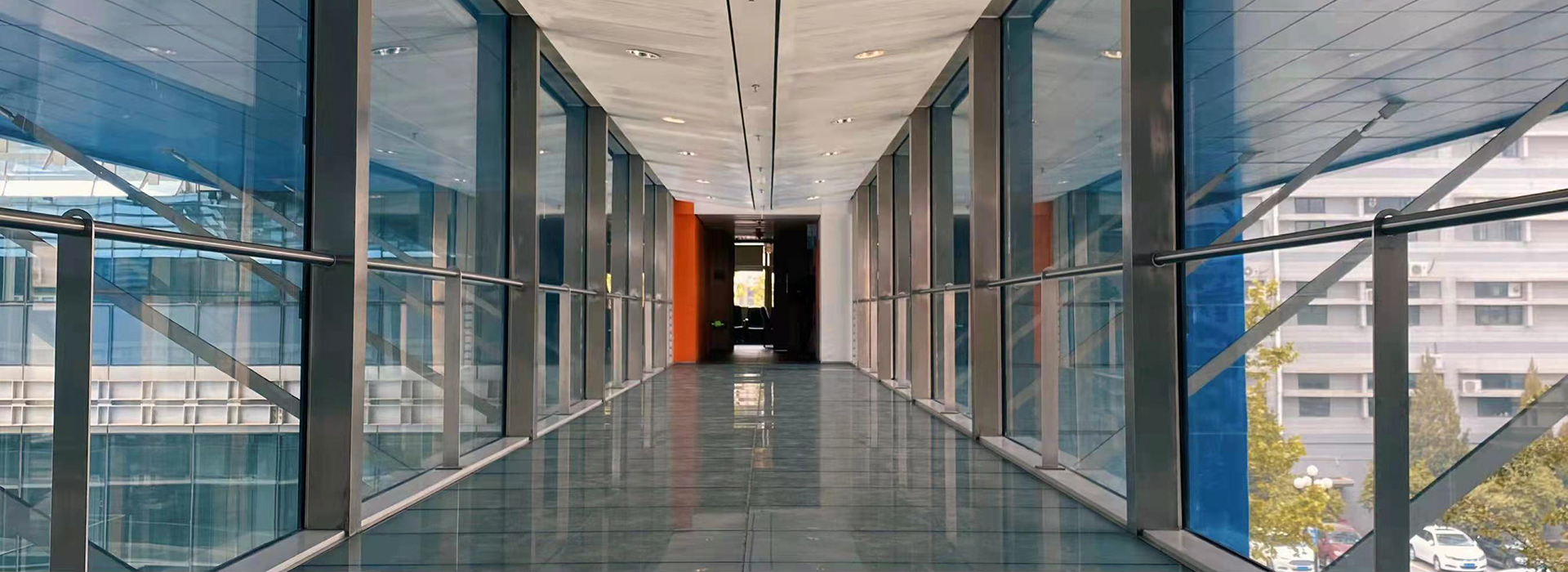On June 8, Final workshop of the Sino-Norwegian Cooperation Project on Capacity Building for Reducing Plastic and Microplastic Pollution (hereinafter referred to as "the Project") was successfully held in Beijing. The meeting was organized by the Basel Convention Regional Centre for Asia and the Pacific (BCRC China), the implementing agency of the Project located in the School of Environment at Tsinghua University. The event was attended by nearly 40 participants, including representatives from the Royal Norwegian Embassy in Beijing, the Norwegian Ministry of Climate and Environment, the Department of International Cooperation, the Department of Solid Waste and Chemicals, the Department of Marine Ecology and Environment of the Ministry of Ecology and Environment (MEE) of the People’s Republic of China, as well as representatives from the participating units and the demonstration cities of the Project.
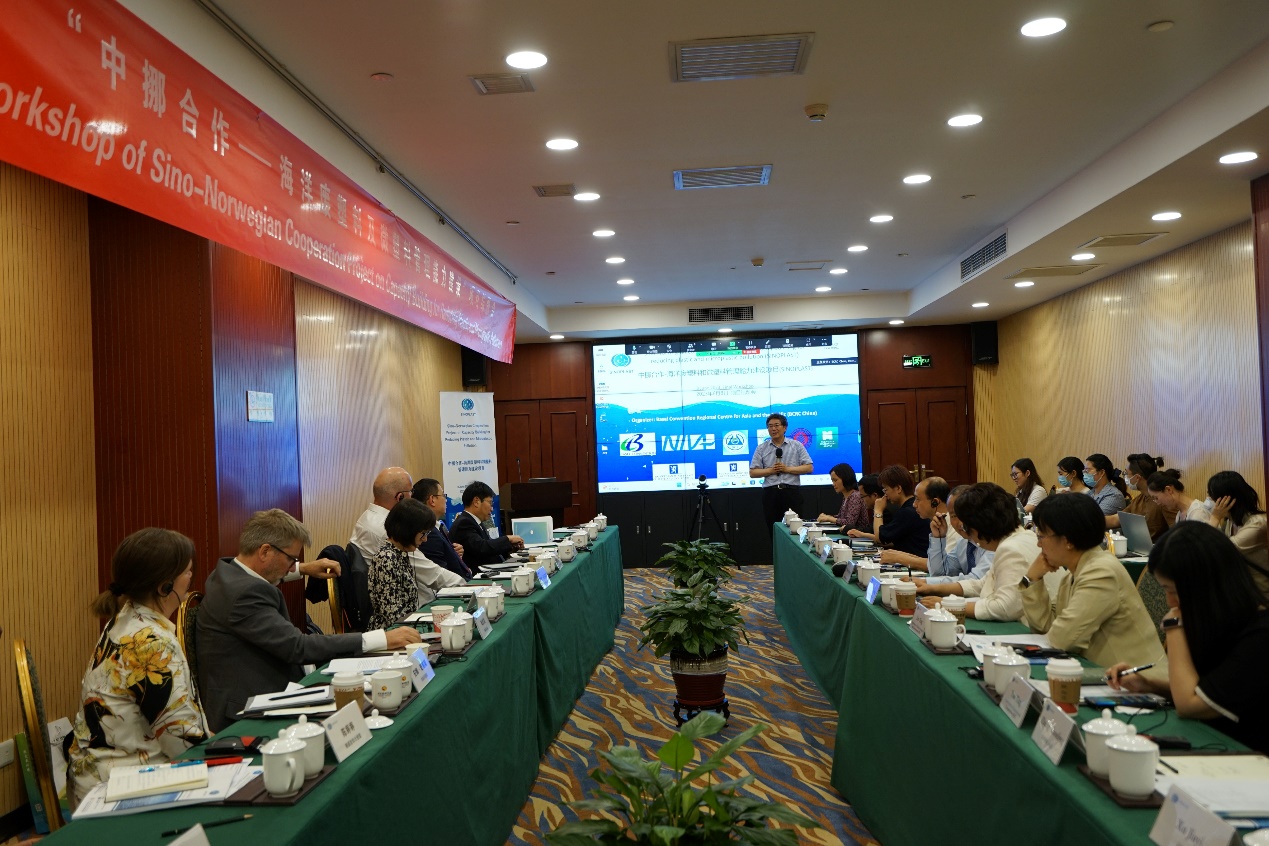
Scene of the final workshop
The meeting featured an opening ceremony, technical exchanges and Project reviews. The opening ceremony was chaired by Li Jinhui, Executive Director of BCRC China/Professor of the School of Environment, Tsinghua University. Opening speeches were delivered by Tom Knappskog, Minister of the Royal Norwegian Embassy in Beijing, Yang Xiaoling, Deputy Director General and First Level counsel of the Department of International Cooperation of MEE, Wen Xuefeng, Deputy Director of the Department of Solid Waste and Chemicals of MEE, and Elin ➢kstad, Senior Green Transition Advisor of the Norwegian Ministry of Climate and Environment. Thorj➢rn Larssen, Deputy Director of the Norwegian Institute of Water Research, reviewed the history of Sino-Norwegian cooperation in the environment field.
In his opening speech, Tom Knappskog expressed that the Final report review of the Project provided a candid and clear assessment of the achieved results and benefits. He emphasized that the project has been extremely successful, yielding outstanding outcomes that significantly contributed to the national " Zero-waste City" policy, as well as addressing issues related to plastics and microplastics. The Project's results played a crucial role in Sino-Norwegian bilateral dialogues. Tom Knappskog highlighted the broad societal benefits derived from sharing project outcomes with other countries, enriching global knowledge, and fostering the training of future professionals. Moreover, he underscored the project's substantial contribution to realizing Norway's plan to combat marine litter and microplastics . The Project held great significance in enhancing the management capacities of both Norwegian and Chinese governments.
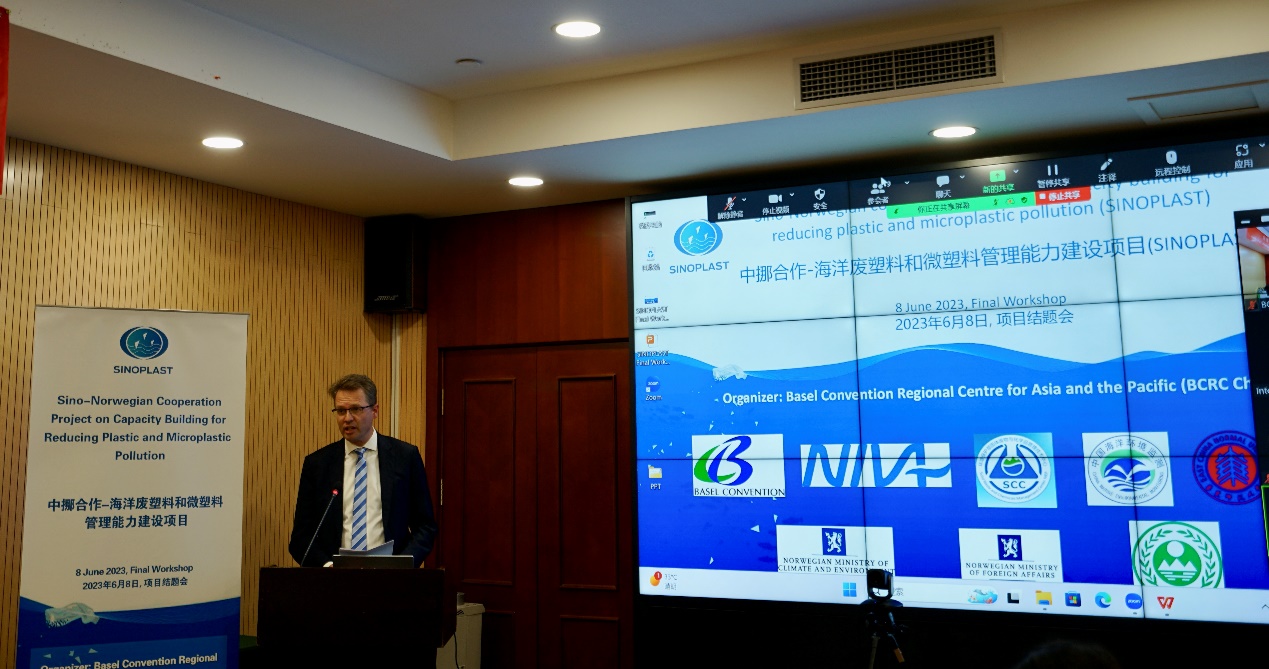
Speech by Tom Knappskog
Yang Xiaoling expressed highly appreciation for the diligent efforts of the participating units in executing the Project. Their hard work has yielded numerous significant results, played a crucial role in advancing the implementation of relevant policies in China, and showcased China's wisdom and experience in addressing global plastic pollution management.
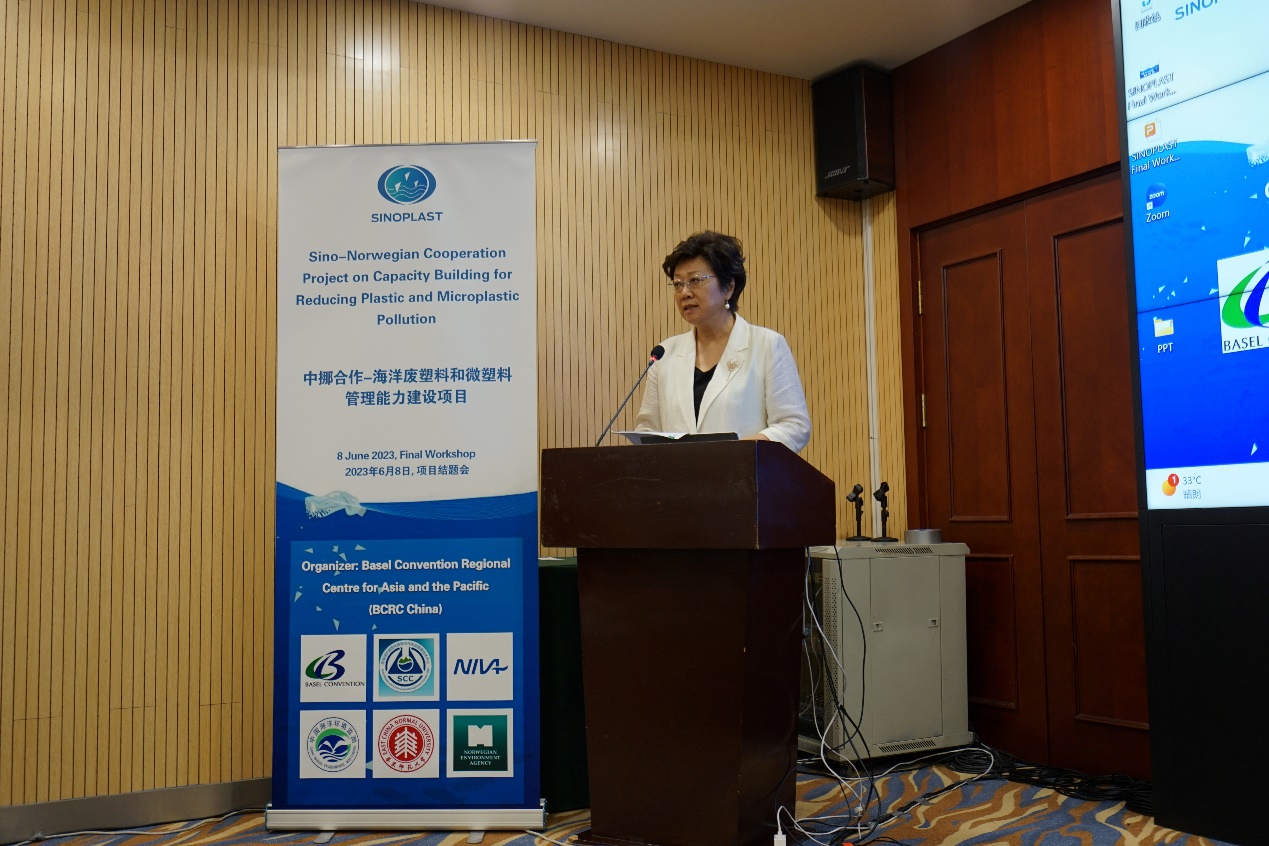
Speech by Yang Xiaoling
Wen Xuefeng said that the Project focuses on marine waste plastics and microplastics, attaches importance to capacity building, which fits the actual needs of China's plastic pollution management, and hopes to continue to strengthen cooperation, deepen friendship, and contribute to global environmental protection by taking practical actions to actively promote the process of the new plastics convention.
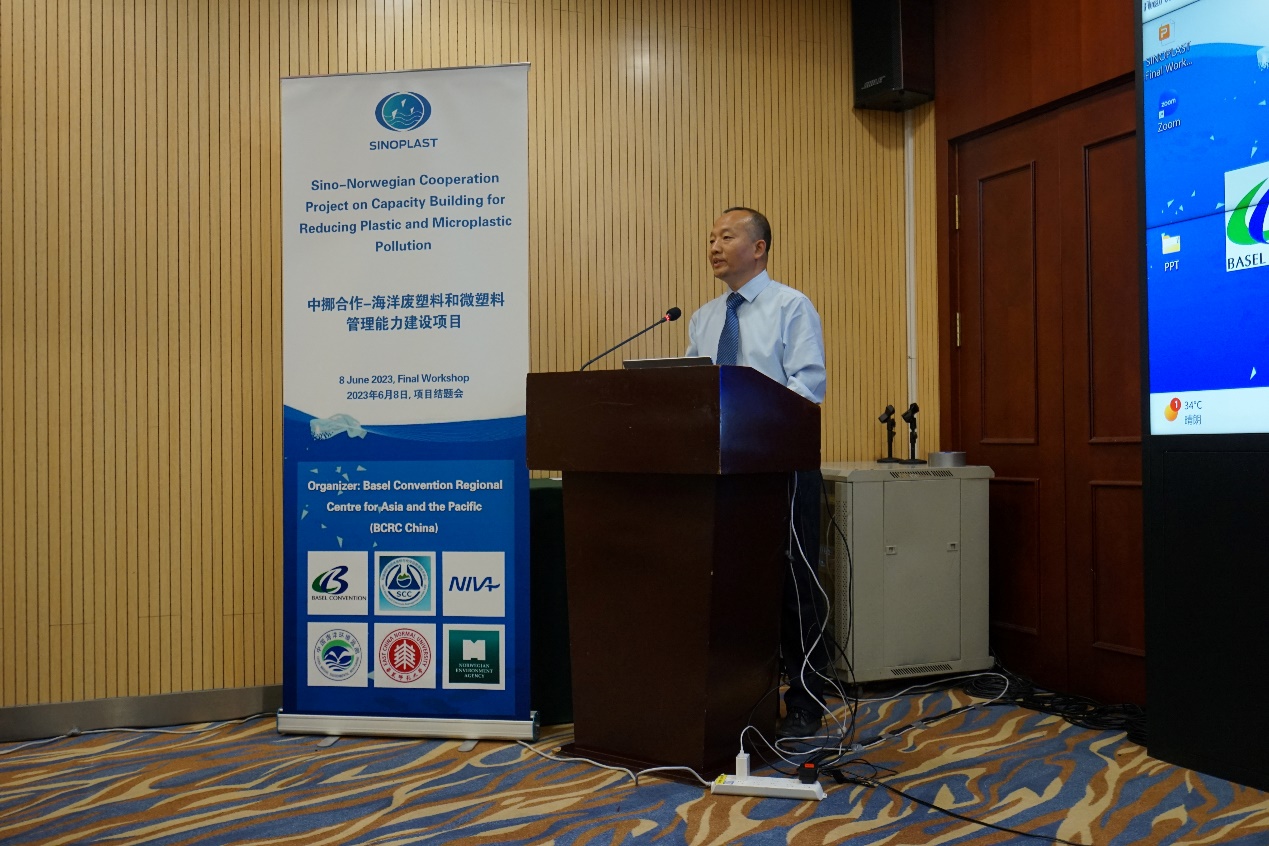
Speech by Wen Xuefeng
The technical exchange session, moderated by Zhao Nana, Assistant Director of BCRC China, featured presentations from project units highlighting their respective research outcomes. Research Fellow Chen Yuan, Chief of the Regional Chemicals Management Branch of BCRC China, provided an overview of the project's implementation and the international and domestic impacts of project outcomes. Ms. Anne C. P. Meaas, Team Coordinator of the Waste and Plastic Pollution of the Norwegian Environment Agency, presented on Norwegian and European policies regarding plastic pollution, along with reflections after INC 2.
Senior Researcher Lin Yan, from the Norwegian Institute of Water Research, introduced capacity building on monitoring and modeling plastics in the environment. Tan Quanyin, Chief of General Office of BCRC China, reported the life cycle assessment case studies of typical products. Additionally, Liu Chunxin, Research Professor from the Solid Waste and Chemicals Management Technology Center of MEE, shared insights into the Environmentally Sound Management of plastic waste in China and Research on the Plastic Reduction Method of Express Package in the Construction of "Zero-Waste City". Engineer Zhang Shoufeng of the National Marine Environmental Monitoring Center introduced the research on marine litter and microplastics monitoring in China, and Associate Professor Xu Jiayi of East China Normal University reported on the development and demonstration of microplastic monitoring methods.
In the review session, Thorj➢rn Larssen invited representatives from the Ministry of Ecology and Environment and the demonstration cities to comment on the project results. All parties acknowledged and commended the outcomes of the project. They agreed that the project is China's first bilateral project coordinating terrestrial and marine plastic pollution prevention and control, it has made a significant positive contribution to enhancing China's management of marine waste plastics and microplastics. All participants expressed consensus on the importance that China and Norway should continue collaboration to further strengthen capacity of China and all the world in controlling plastic pollution.
In closing conclusion, Li Jinghui once again expressed gratitude to the Norwegian Ministry of the Environment and the Royal Norwegian Embassy in Beijing for their support throughout the project's implementation. He also acknowledged the Ministry of Ecology and Environment of the People’s Republic of China for its meticulous guidance and extended appreciation to the participating units for their valuable contributions and efforts. Li Jinghui emphasized that plastic pollution management is a long journey, emphasizing the need for ongoing collaboration. He looked forward to sustained cooperation to make more significant contributions to global plastic pollution control efforts.
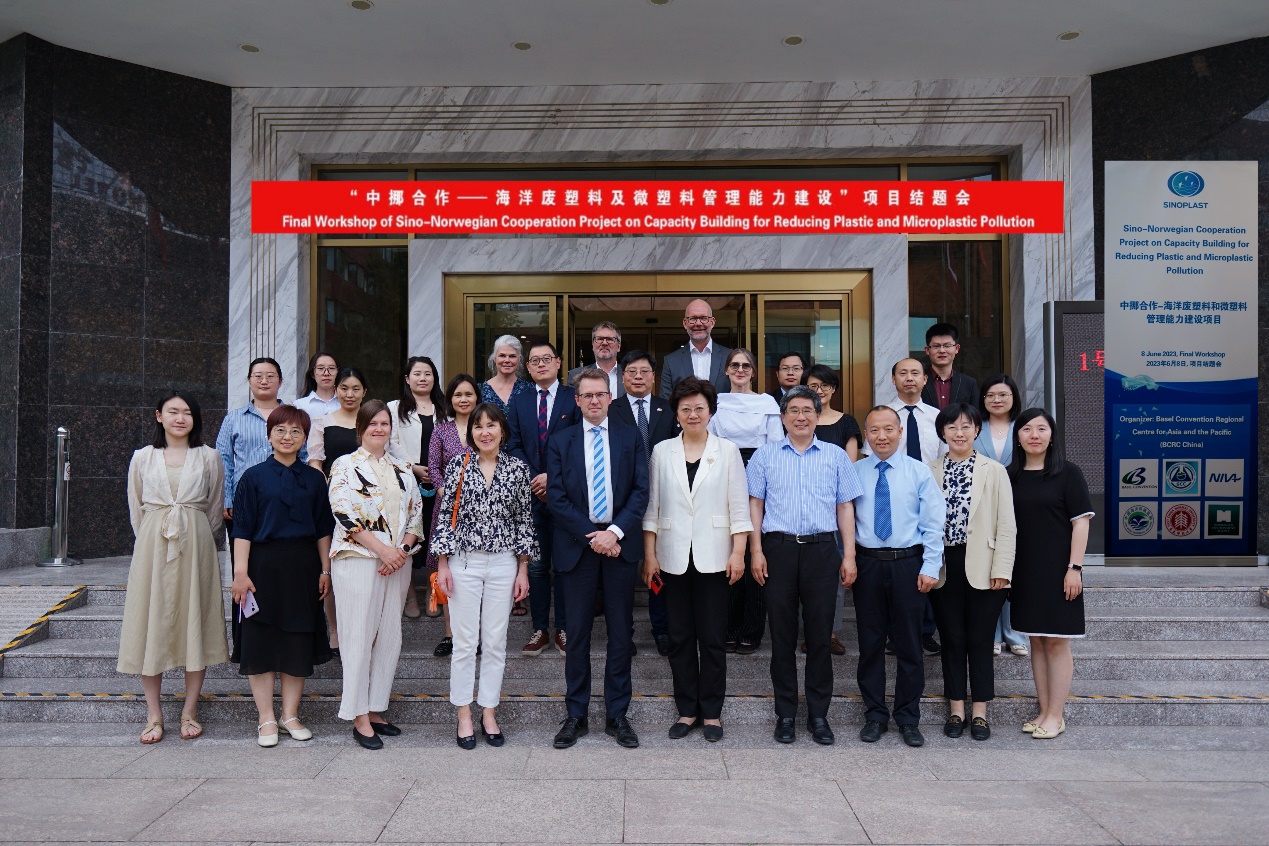
Group photo of the participants
The project, titled " the Sino-Norwegian Cooperation on Capacity Building for Reducing Plastic and Microplastic Pollution," received approval from the Ministry of Commerce of the People’s Republic of China and the Royal Norwegian Embassy in Beijing on December 29, 2019. The project aims to contribute to China's efforts in controlling marine waste plastics and microplastics pollution through activities such as baseline studies, environmental impact assessment, development of pollution monitoring techniques and tools, policy studies, awareness raising. The Chinese units involved in the project includes the Solid Waste and Chemicals Management Technology Center of the Ministry of Ecology and Environment, the National Marine Environmental Monitoring Center, and the State Key Laboratory of Estuarine and Coastal Research at East China Normal University. On the Norwegian side, the project is led by the Norwegian Institute for Water Research, with the Norwegian Environment Agency as a participating organization.
Contributed by: Basel Convention Regional Centre for Asia and the Pacific



